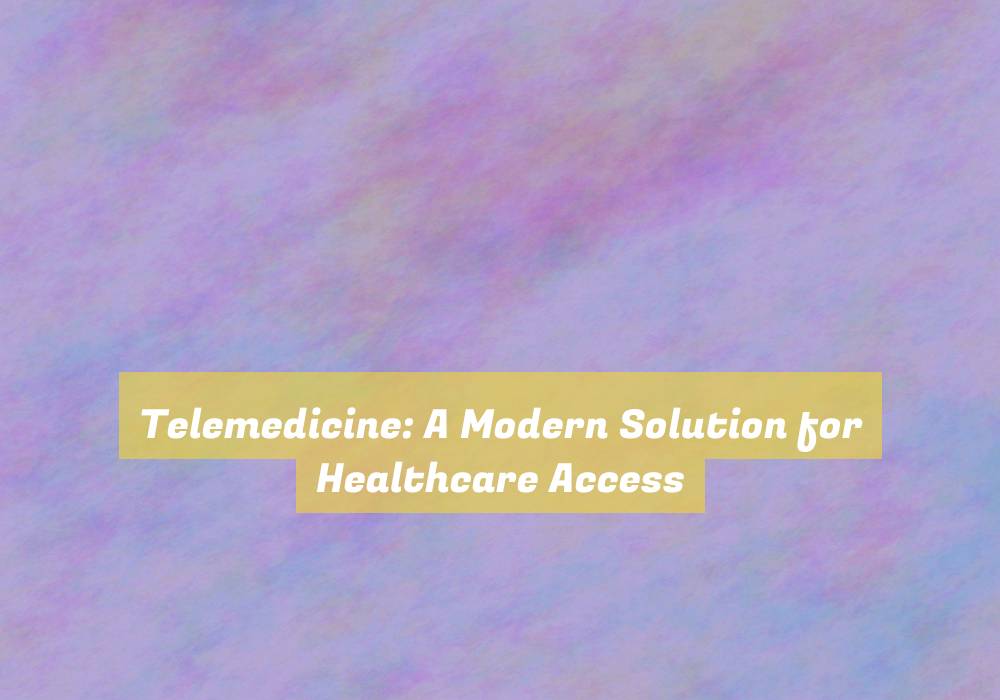Telemedicine: A Modern Solution for Healthcare Access
You may not realize that telemedicine has been around for decades, quietly evolving and gaining momentum as a modern solution for healthcare access.
As technology continues to advance, so does the potential for telemedicine to revolutionize the way we receive medical care.
Imagine being able to consult with a healthcare provider from the comfort of your own home, without the hassle of traveling to a clinic or hospital. This convenience is just one of the many benefits that telemedicine offers.
And there is much more to explore about how it is shaping the future of healthcare.
The Evolution of Telemedicine
Telemedicine has rapidly evolved from its early days of simple phone consultations to advanced video conferencing and remote monitoring technologies. In the past, telemedicine primarily involved basic communication through phone calls. However, with technological advancements, it has now transitioned to encompass video conferencing, allowing for more comprehensive virtual consultations. Remote monitoring technologies have also played a significant role in this evolution.
Patients can now use wearable devices to track vital signs and transmit this data to healthcare providers in real-time, enabling proactive and personalized care.
Moreover, telemedicine has expanded its reach beyond individual consultations to include specialized services such as teledermatology, telepsychiatry, and telestroke care. These advancements have significantly improved access to healthcare, especially for individuals in remote or underserved areas.
The convenience and efficiency of telemedicine have also been enhanced through the integration of electronic health records (EHRs) and digital prescription capabilities, streamlining the entire healthcare process.
As technology continues to advance, telemedicine is poised to further revolutionize healthcare delivery, making it more accessible and convenient for patients while also improving overall health outcomes.
Benefits of Telemedicine
Patients in remote areas can access specialized healthcare services conveniently through telemedicine, improving their overall health outcomes.
One of the key benefits of telemedicine is increased access to medical care. It allows individuals in rural or underserved areas to connect with healthcare providers without the need to travel long distances, saving time and money.
Moreover, telemedicine can also reduce the burden on traditional healthcare facilities by providing an alternative for non-emergency consultations, which can help alleviate overcrowding and long wait times.
Additionally, telemedicine offers greater convenience for patients, as they can schedule appointments and receive care from the comfort of their own homes. This is especially beneficial for individuals with mobility limitations or those who require frequent check-ins with healthcare professionals.
Furthermore, telemedicine can enhance care coordination among different healthcare providers, leading to more comprehensive and integrated treatment plans for patients with complex medical needs.
Telemedicine Technology Advancements
With rapid advancements in technology, telemedicine has significantly expanded its capabilities, revolutionizing the way healthcare services are delivered.
The integration of artificial intelligence (AI) and machine learning algorithms has allowed for more accurate diagnoses and personalized treatment plans.
Remote patient monitoring devices, such as wearables and IoT-enabled tools, have enabled healthcare providers to gather real-time data from patients, leading to more proactive and preventive care.
Moreover, the development of secure and user-friendly telemedicine platforms has enhanced the patient experience, making it easier for individuals to connect with healthcare professionals from the comfort of their homes.
Additionally, the use of virtual reality (VR) and augmented reality (AR) technologies has facilitated medical training and surgical simulations, improving the skills of healthcare practitioners.
Furthermore, the adoption of blockchain technology has bolstered data security and interoperability, ensuring the privacy and integrity of electronic health records.
These technological advancements in telemedicine continue to drive innovation, making healthcare more accessible, efficient, and patient-centered.
Overcoming Barriers to Healthcare Access
Despite the remarkable technological advancements in telemedicine, the challenge of overcoming barriers to healthcare access remains a critical concern in ensuring equitable and widespread delivery of medical services. One of the key barriers is the lack of access to high-speed internet in rural and underserved areas. Without reliable internet, individuals may not be able to utilize telemedicine services effectively. Additionally, some people may lack the necessary digital literacy or access to the required devices for telemedicine consultations, further hindering their ability to benefit from this modern solution.
Language and cultural barriers can also impede healthcare access. Patients who donG??t speak the predominant language in their region may struggle to communicate effectively with healthcare providers, leading to misunderstandings and inadequate care. Moreover, certain cultural beliefs and practices may pose challenges in accepting telemedicine as a viable option for seeking medical assistance.
Furthermore, financial constraints can prevent individuals from accessing telemedicine services. Even though telemedicine can potentially reduce healthcare costs, there may still be out-of-pocket expenses for patients, such as co-pays or costs associated with internet access and compatible devices.
In order to truly maximize the potential of telemedicine and ensure healthcare access for all, itG??s crucial to address and overcome these barriers. Efforts to expand internet infrastructure, provide digital literacy education, offer language interpretation services, and make telemedicine more financially accessible are essential steps in achieving healthcare equity through telemedicine.
Conclusion
In conclusion, telemedicine is revolutionizing healthcare access by providing convenient and efficient ways for patients to receive medical care.
With advancements in technology and the ability to connect with healthcare providers remotely, barriers to access such as distance and mobility are being overcome.
This modern solution not only improves patient outcomes, but also reduces healthcare costs and increases overall accessibility to quality care.
Telemedicine is truly shaping the future of healthcare.
